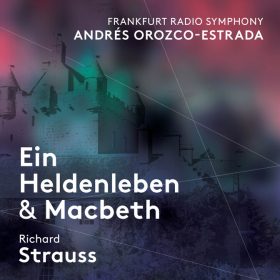We are proud to share with you that our release of Richard Strauss – Ein Heldenleben/ Macbeth is chosen to be the Recording of the Month on MusicWeb International. The review praised the brilliant performance of Andrés Orozco – Estrada and the Frankfurt Radio Symphony. Read the glowing review below.
If the opening of Orozco-Estrada’s Ein Heldenleben is strident and surges with real heroic girth, he is also more than awake to the autobiographical intensity of the work’s exquisite beauties. The horn call, recalling Don Juan, is magnificent with his Frankfurt players impassioned, almost erotic in the sheer beauty of their playing. Harps are voluptuous, woodwind not just crisp but phrasing like arias, the cadenza for solo violin as beautifully played as any on disc. Arpeggios, broken chords, rapid scale passages and triple stopping are all beautifully played but done so with an eye, and ear, for portraiture. Soaring strings and harp glissandos are truly operatic in the love music, as sweeping and opulent as they recall Tristan und Isolde. The Battle Scene is explosive and titanic, more monumental than some, for sure. I missed the sheer dramatic power that Takashi Asahina brings to this music in a live recording with the Osaka Philharmonic: where Asahina is furious, Orozco-Estrada is mighty and weighty his adversaries perhaps more Teutonic and strident, whereas Asahina throws everything into the battlefield, and then some more. Both views are perfectly viable, and both conductors are brilliantly attuned to Strauss’ militaristic rhythms. Pentatone’s sound is glorious at highlighting orchestral figures in this battlefield, a stray trumpet, shrieking piccolos, calamitous percussion like an artillery of weapons on the rampage. It’s all the more peculiar, then, that just before the battle starts, trumpets at 19’56 and again at 20’37 have a distinct balance towards the right ear only. Whilst Strauss does mark in his score that three trumpets at Reh.42 should be “hinter der scene” other recordings aren’t quite as extreme as Pentatone are, seemingly giving the left ear dead sound.

Orozco-Estrada’s Macbeth is no less riveting, though the work itself caused Strauss no end of problems and remains one of his less well-known Tone Poems. Written, and revised, between 1886-1888 (not 1897-98 as Pentatone incorrectly claim) the work owes debts to both Liszt and Wagner: Liszt for its depiction of the characters within a psychological drama, and Wagner for its musical language. The dramatic opening to the work (not unlike Also Sprach with its huge fanfare motif), and with its implied references to monarchy and power, perhaps sound derivative of Wagner, and even Beethoven, but Strauss’ malevolent and rich scoring is very much his own. Stark and horrific his characterization of both Macbeth and Lady Macbeth may be, as the music becomes more and more insidious, he works in tremendous climaxes, mighty fanfares and long pauses along the way. Orozco-Estrada and the Frankfurt Radio Symphony play the piece for all it’s worth, encapsulating both the neurotic psychodrama of the work as well as its epic, brooding bleakness (those bass trumpets!) in playing that never lacks the voltage or dynamite of the macabre, or the theatrical with its off-stage side-drum rolls. Pentatone’s full sound exploits the orchestra’s dark, thrilling sound.
Read the complete review here


